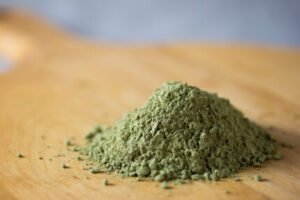Medically reviewed by Dr. Ramesh Gaddam, M.D. — Written by Sumalatha, D.N.H.E
Nutrition of Insulin Plant
Nutritional profile of insulin plant leaves per 100 grams:
| Nutrient | Amount |
|---|---|
| Calories | 49 |
| Protein | 4.2 grams |
| Fat | 0.4 grams |
| Carbohydrates | 8.3 grams |
| Fiber | 3.2 grams |
| Calcium | 344 mg |
| Iron | 4.6 mg |
| Phosphorus | 82 mg |
| Vitamin C | 16.5 mg |
| Vitamin A | 46 µg |
| Vitamin E | 2.3 mg |
Please note that these values are approximate and can vary based on factors such as growing conditions and plant maturity.
Potential Diabetic Properties of Insulin Plant
The insulin plant (Costus igneus) has been traditionally used in some cultures for its potential diabetic properties. Here are some ways in which the insulin plant may be beneficial for individuals with diabetes:

Blood Sugar Regulation:
One of the primary purported benefits of the insulin plant is its ability to help regulate blood sugar levels.
Some studies suggest that compounds found in the plant may act similarly to insulin, facilitating the uptake of glucose by cells and thus lowering blood glucose levels.
This action could potentially benefit individuals with diabetes by improving glycemic control.
Insulin Sensitizing Effects:
Research indicates that certain compounds present in the insulin plant may have insulin-sensitizing properties.
These compounds may help improve insulin sensitivity in the body, allowing cells to respond more effectively to insulin and promoting better glucose utilization.
Improved insulin sensitivity is beneficial for individuals with diabetes, particularly those with insulin resistance.
Antioxidant Activity:
The insulin plant contains antioxidants, such as flavonoids and phenolic compounds, which help combat oxidative stress.
Oxidative stress is associated with the development and progression of diabetes-related complications.
By neutralizing free radicals and reducing oxidative damage, the antioxidants in the insulin plant may help protect pancreatic beta cells and preserve insulin production.
Anti-inflammatory Properties:
Chronic inflammation plays a role in the pathogenesis of diabetes and its complications.
Some compounds found in the insulin plant exhibit anti-inflammatory effects, which may help mitigate inflammation and contribute to improved metabolic health in individuals with diabetes.
Glycemic Control Support:
Incorporating insulin plant extracts or preparations into the diet may aid in glycemic control by modulating glucose metabolism and insulin signaling pathways.
However, more research is needed to elucidate the specific mechanisms underlying the plant’s effects on blood sugar regulation.
Summary
It’s essential to emphasize that while the insulin plant shows promise as a potential adjunctive therapy for diabetes management, scientific evidence supporting its efficacy and safety is still limited.
Individuals with diabetes should consult with healthcare professionals before incorporating insulin plant products into their treatment regimen.
Additionally, insulin plant consumption should not replace standard medical treatments for diabetes, such as medication, dietary modifications, and regular monitoring of blood sugar levels.
Uses of Insulin Plant
The insulin plant (Costus igneus) is utilized for various purposes, primarily in traditional medicine systems, where it’s believed to offer several health benefits. Here are some common uses of the insulin plant:
Diabetes Management:
The insulin plant is most renowned for its potential to aid in managing diabetes. It’s believed to possess compounds that mimic the action of insulin, helping to regulate blood sugar levels.
People with diabetes may consume the leaves raw, in the form of juice, or as supplements in an attempt to support their diabetes management.
However, it’s essential for individuals with diabetes to consult healthcare professionals before using insulin plant as a complementary treatment.
Antioxidant Support:
Insulin plant leaves contain antioxidants, such as flavonoids and phenolic compounds, which help neutralize harmful free radicals in the body.
These antioxidants are thought to protect cells from oxidative damage and may contribute to overall health and well-being.
Anti-inflammatory Properties:
Some compounds found in the insulin plant exhibit anti-inflammatory effects, which may help alleviate inflammation in the body.
Chronic inflammation is associated with various health conditions, including arthritis, cardiovascular disease, and certain metabolic disorders.
Digestive Health:
Insulin plant leaves are a good source of dietary fiber, which supports digestive health by promoting regular bowel movements and preventing constipation.
Fiber also helps maintain a healthy balance of gut bacteria, which is essential for optimal digestion and nutrient absorption.
Immune System Boost:
The presence of vitamins and minerals in insulin plant leaves, such as vitamin C and iron, may help support a healthy immune system.
Vitamin C is known for its immune-boosting properties, while iron is essential for the proper functioning of immune cells.
Skin Care:
Some proponents suggest that applying insulin plant extract topically may help improve skin health and alleviate certain skin conditions.
However, scientific evidence supporting this use is limited, and more research is needed to validate its effectiveness.
Note:
It’s important to note that while the insulin plant is believed to offer potential health benefits, scientific evidence supporting its uses is still emerging, and more research is needed to confirm its efficacy and safety.
Individuals considering the use of insulin plant for any health-related purposes should consult with healthcare professionals, especially if they have underlying medical conditions or are taking medications.
Side Effects of Insulin Plant
While the insulin plant (Costus igneus) is generally considered safe for most people when consumed in moderation, there is limited scientific research available on its potential side effects.

However, here are some considerations to keep in mind:
Allergic Reactions:
Some individuals may be allergic to certain compounds present in the insulin plant.
Allergic reactions can range from mild symptoms, such as itching or skin rash, to more severe reactions like difficulty breathing or anaphylaxis.
If you experience any signs of an allergic reaction after consuming or coming into contact with the insulin plant, seek medical attention immediately.
Gastrointestinal Distress:
In some cases, consumption of the insulin plant may cause gastrointestinal discomfort, such as stomach upset, bloating, gas, or diarrhea.
This may occur particularly in individuals who are sensitive to dietary fiber or certain components of the plant.
Drug Interactions:
Insulin plant supplements or extracts may interact with certain medications, including diabetes medications, anticoagulants, and blood pressure medications.
If you are taking any prescription medications, it’s important to consult with a healthcare professional before using insulin plant products to avoid potential interactions.
Hypoglycemia Risk:
Since the insulin plant is believed to help lower blood sugar levels, consuming it in large quantities or in combination with diabetes medications could potentially lead to hypoglycemia (low blood sugar).
Individuals with diabetes should monitor their blood sugar levels closely and adjust their medication dosages as necessary under the guidance of a healthcare provider.
Pregnancy and Breastfeeding:
There is limited information available regarding the safety of insulin plant consumption during pregnancy and breastfeeding.
As a precaution, pregnant or breastfeeding women should consult with a healthcare professional before using insulin plant products to ensure safety for themselves and their babies.
Quality and Purity:
The safety and efficacy of insulin plant supplements or extracts may vary depending on factors such as manufacturing practices, product quality, and purity.
It’s essential to choose reputable brands and products that have been tested for quality and purity to minimize the risk of adverse effects.
As with any herbal remedy or dietary supplement, it’s important to use insulin plant products responsibly and in consultation with a healthcare professional, especially if you have underlying health conditions or are taking medications.
If you experience any adverse effects or concerns while using insulin plant, discontinue use and seek medical advice promptly.
How to Eat Insulin Plant
Insulin plant (Costus igneus) leaves can be consumed in various ways to potentially benefit from its purported health properties. Here are some common methods of consuming insulin plant:

Raw Consumption:
Wash the insulin plant leaves thoroughly and consume them raw. You can eat the leaves directly or incorporate them into salads or other dishes as a nutritious green vegetable.
Juicing:
Another popular way to consume insulin plant is by juicing the leaves. Simply wash the leaves, remove any tough stems, and blend them with water or other fruits and vegetables to make a nutritious juice.
You can add a sweetener like honey or stevia if desired.
Tea:
Insulin plant leaves can be used to make herbal tea. Wash the leaves, chop them into small pieces, and steep them in hot water for several minutes.
Strain the tea and drink it plain or add a natural sweetener like honey.
Powdered Supplement:
Insulin plant leaves can be dried and ground into a fine powder, which can then be encapsulated or mixed into smoothies, yogurt, or other foods for easy consumption.
This powdered form may also be available commercially as a dietary supplement at Amazon Insulin Plant Powder
Cooking:
Insulin plant leaves can be cooked in various dishes, similar to other leafy greens.
You can sauté them with garlic and olive oil, add them to soups or stews, or incorporate them into stir-fries and curries.
Topical Application:
Some people use insulin plant extracts topically for skin-related issues, such as wounds, cuts, or skin infections.
However, it’s essential to exercise caution and perform a patch test before applying insulin plant extract to the skin to avoid potential allergic reactions.
When consuming insulin plant or any herbal remedy, it’s important to start with small amounts and monitor your body’s response.
Additionally, consult with a healthcare professional, especially if you have any underlying health conditions or are taking medications, to ensure that insulin plant consumption is safe and appropriate for you.
Insulin Plant Powder

Insulin plant powder is a form of the Costus igneus plant that has been dried and ground into a fine powder.
This powdered form allows for easy storage, transportation, and consumption, making it convenient for individuals looking to incorporate the plant into their diets or health regimens.
Insulin plant powder is typically made from the leaves of the insulin plant, which are believed to contain compounds that mimic the action of insulin and may help regulate blood sugar levels.
Potential benefits of insulin plant powder
Insulin plant powder, derived from the insulin plant (Costus igneus), is believed to offer several potential health benefits:
Blood Sugar Regulation:
Insulin plant powder is often used as a natural remedy for managing diabetes due to its purported ability to help regulate blood sugar levels.
Some studies suggest that compounds found in the insulin plant may mimic the action of insulin, facilitating glucose uptake by cells and potentially lowering blood glucose levels.
Antioxidant Support:
Insulin plant powder contains antioxidants, such as flavonoids and phenolic compounds, which help neutralize harmful free radicals in the body.
These antioxidants may protect cells from oxidative damage and support overall health and well-being.
Digestive Health:
The fiber content in insulin plant powder may promote digestive health by supporting regular bowel movements and preventing constipation.
Fiber also helps maintain a healthy balance of gut bacteria, which is essential for optimal digestion and nutrient absorption.
Immune System Support:
Insulin plant powder provides vitamins and minerals that support a healthy immune system, such as vitamin C and iron.
Vitamin C is known for its immune-boosting properties, while iron is essential for immune cell function.
Convenience:
Insulin plant powder offers a convenient way to incorporate the health benefits of the plant into your daily routine.
It can be easily added to smoothies, juices, yogurt, oatmeal, or other foods and beverages for an extra nutritional boost.
Caution
When using insulin plant powder or any herbal supplement, it’s essential to follow dosage recommendations and consult with a healthcare professional, especially if you have underlying health conditions or are taking medications.
While insulin plant powder may offer potential health benefits, scientific evidence supporting its efficacy and safety is still limited, and more research is needed to confirm its effects.
Where to Buy Insulin Powder for Diabetes?
To get insulin powder directly delivered to you home: Buy Insulin Powder
Frequently Asked Questions
Can I Boil Insulin Plant Leaves?
Yes, you can boil insulin plant leaves to make tea or extract their beneficial compounds.
To prepare insulin plant tea, wash the leaves thoroughly, chop them into small pieces, and add them to boiling water.
Let the leaves steep for a few minutes, then strain the tea and enjoy.
Boiling the leaves can help release their nutrients and potential health benefits.
Does Insulin Plant Really Work?
The effectiveness of insulin plant (Costus igneus) in managing diabetes and other health conditions is still a topic of ongoing research.
While some studies suggest that compounds found in the plant may help regulate blood sugar levels and improve insulin sensitivity, more rigorous scientific evidence is needed to confirm its efficacy.
It’s essential to consult with a healthcare professional before using insulin plant or any herbal remedy as a treatment for diabetes or other medical conditions.
Is Insulin Plant Good for Diabetes?
Insulin plant is often promoted as a natural remedy for diabetes due to its purported ability to help regulate blood sugar levels.
Some people believe that consuming insulin plant leaves or extracts may mimic the action of insulin in the body, leading to improved glycemic control.
However, scientific evidence supporting the use of insulin plant for diabetes management is limited, and further research is necessary to validate its effectiveness and safety.
Insulin Plant for High Blood Pressure
While insulin plant is primarily associated with diabetes management, some proponents suggest that it may also have benefits for individuals with high blood pressure (hypertension).
However, scientific research specifically examining the effects of insulin plant on blood pressure is lacking.
As such, it’s important to approach claims regarding the use of insulin plant for hypertension with caution and consult with a healthcare professional for personalized advice on managing high blood pressure.
How to Use Insulin Plant Leaves for Diabetes?
To use insulin plant leaves for diabetes, you can incorporate them into your diet in various ways:
Raw Consumption:
Wash insulin plant leaves thoroughly and consume them raw as a salad green or snack.
Tea:
Boil insulin plant leaves to make herbal tea. Steep the leaves in boiling water for a few minutes, then strain and drink the tea.
Juicing:
Blend insulin plant leaves with water or other fruits and vegetables to make a nutritious juice.
Powdered Supplement:
Dried insulin plant leaves can be ground into a fine powder and added to smoothies, yogurt, or other foods for an extra nutritional boost.
Before using insulin plant or any herbal remedy for diabetes management, it’s important to consult with a healthcare professional to ensure it’s safe and appropriate for you, especially if you’re already taking medications or have underlying health conditions.
Medically reviewed by Dr. Ramesh Gaddam, M.D.

General Physician, Diabetologist, and Critical Care Specialist.
Discover more from Health Build-Up
Subscribe to get the latest posts sent to your email.

